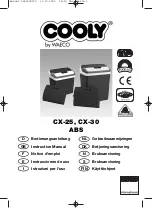
ENGLISH
en
10
Do not use both connection cables at the same time
to avoid damage.
Keep the connection cables away from sharp
edges, do not bent, do not tie together and do not
place anything on them.
Fire hazard. Do not expose the device to high
temperatures or open fire.
Do not expose to direct sunlight or heat sources.
Keep the device away from moisture, rain, wetness.
No liquids may enter the device. Otherwise there is
a risk of electrical shock and damage to the device.
Do not use this device near water.
Never put liquids or ice in the device. Place only
package food and packaged beverages in the
container.
Do not expose to excessive vibrations, shocks or
impacts.
Do not let any foreign objects enter the device
through the ventilation slots.
Risk of overheating. Always keep the ventilation
slots free, do not cover, block or do not put anything
inside. Always maintain sufficient distance to walls
and object so that the air can circulate freely.
Do not use adapter plugs or extension cords.
Risk of electric shock. Keep the connection cables
dry. Do not touch with wet hands.
When disconnecting the power supply: Do not pull
on the cable. Grab the plug instead.
Do not operate the device in explosive
atmospheres, such as in the presence of
flammable liquids, gases or dust.
Tools create
sparks which may ignite the dust or fumes.
Tool plugs must match the outlet. Never modify
the plug in any way.
Unmodified plugs and
matching outlets will reduce risk of electric shock.
Have your device serviced by a qualified repair
person using only genuine replacement parts.
This will ensure that the device functions safely.
To avoid contamination of food, the following
instructions must be observed:
- If the lid is opened for an extended period of time,
there may be a significant rise in temperature in
the compartments of the device.
- Store raw meat and fish in suitable containers so
that it does not touch or drip onto other food.
- Regularly clean surfaces that may come into
contact with food.
- If the device is left empty for an extended period of
time, switch off the device, defrost it, clean it and
leave the lid open to prevent mould growth.
4.1 Special safety instructions for battery
pack and battery-powered devices
Only recharge with the charger specified by the
manufacturer.
A charger that is suitable for one
type of battery pack may create a risk of fire when
used with another battery pack.
Use devices only with specifically designated
battery packs.
Use of any other battery packs may
create a risk of injury and fire.
When not in use, keep batteries away from
paper clips, coins, keys, nails, screws or other
small metal objects that could bridge the
contacts.
Shorting the battery terminals together
may cause burns or a fire.
Under abusive conditions, liquid may be
ejected from the battery. Avoid contact. If
contact accidentally occurs, flush with water. If
liquid contacts eyes, additionally seek medical
help.
Liquid ejected from the battery may cause
irritation or burns.
Do not use a battery pack or tool that is
damaged or modified.
Damaged or modified
batteries may exhibit unpredictable behaviour
resulting in fire, explosion or risk of injury.
Do not expose a battery pack or tool to fire or
excessive temperature.
Exposure to fire or
temperature above 130 °C (265 °F) may cause
explosion.
Follow all charging instructions and do not
charge the battery pack outside the
temperature range specified in the
instructions.
Charging improperly or at
temperatures outside the specified range may
damage the battery and increase the risk of fire.
Never service damaged battery packs.
Service
of battery packs should only be performed by the
manufacturer or authorized service providers.
Remove the battery pack from the device before
making any adjustments, changing tools,
maintaining or cleaning.
Protect battery packs from water and
moisture!
Do not expose battery packs to fire!
Do not use faulty or deformed battery packs!
Do not open battery packs!
Do not touch or short circuit battery pack contacts!
A slightly acidic, flammable fluid may leak
from defective Li-ion battery packs!
If battery fluid leaks out and comes into
contact with your skin, rinse immediately
with plenty of water. If battery fluid leaks out
and comes into contact with your eyes, wash them
with clean water and seek medical attention
immediately!
If the device is defective, remove the battery pack
from the device.
Transport of li-ion battery packs:
The shipping of li-ion battery packs is subject to
laws related to the carriage of hazardous goods (UN
3480 and UN 3481). Inform yourself of the currently
valid specifications when shipping li-ion battery
packs. If necessary, consult your freight forwarder.
Certified packaging is available from Metabo.
Only send the battery pack if the housing is intact
and no fluid is leaking. Remove the battery pack
from the device when shipping it. Prevent the
contacts from short-circuiting (e.g. by protecting
them with adhesive tape).




























